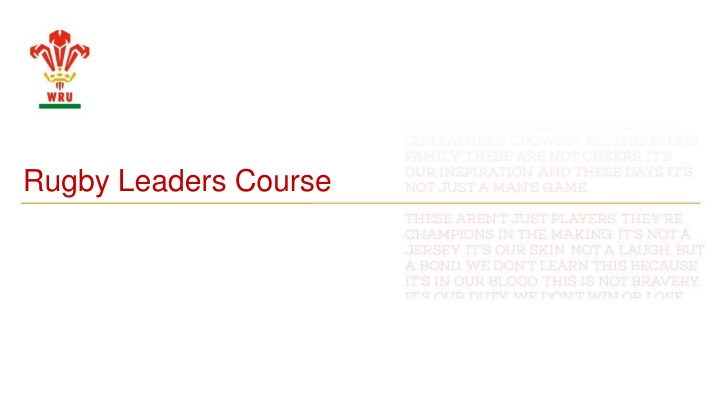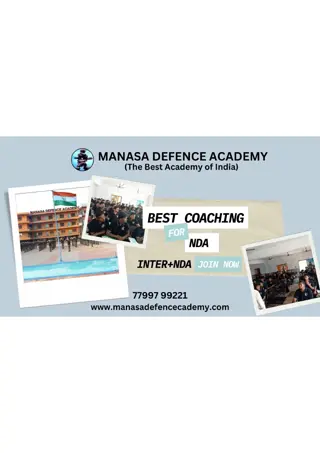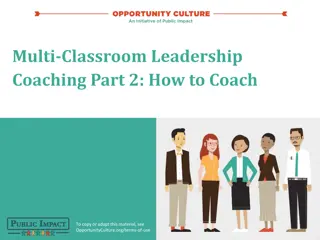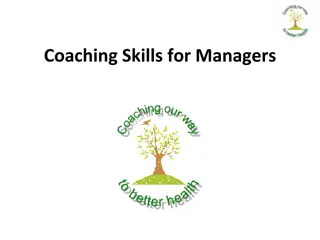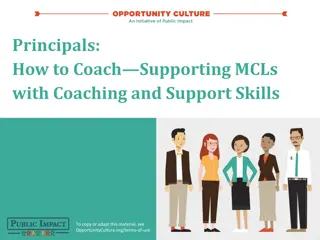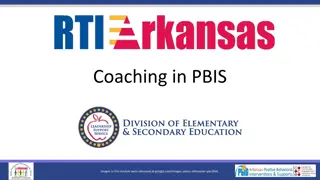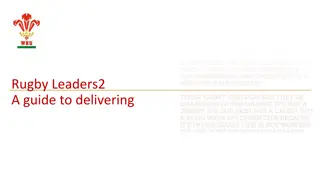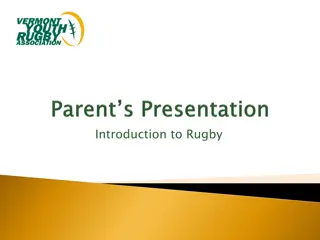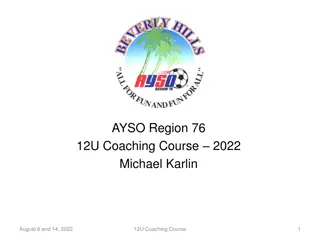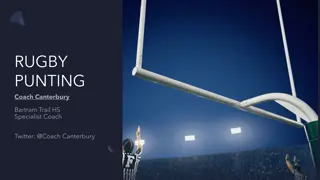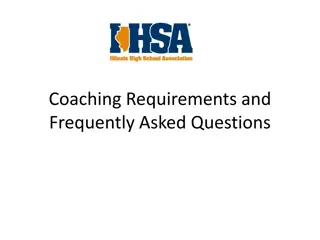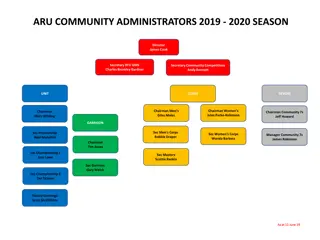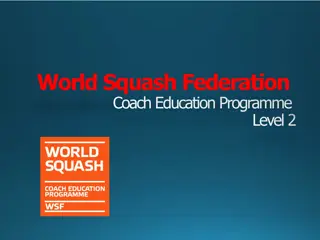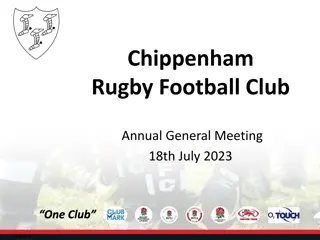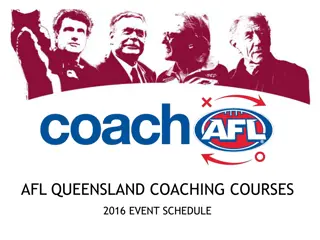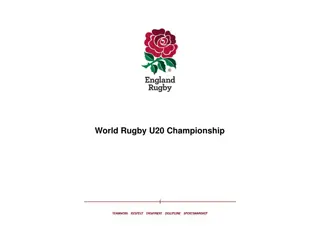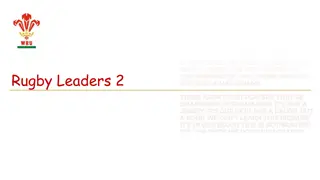Rugby Leaders Course Overview and Best Coaching Practices
The Rugby Leaders Course provides insights into coaching strategies, creating a safe learning environment, and the Whole Player, Whole Coach approach. The course is led by James Leppard, focusing on enhancing coaching skills and tactical knowledge. Participants engage in activities like icebreakers, discussions on coaching inspiration, and learning outcomes. The Best Coaching Practices emphasize preparedness, inclusivity, positive reinforcement, and effective communication.
Download Presentation

Please find below an Image/Link to download the presentation.
The content on the website is provided AS IS for your information and personal use only. It may not be sold, licensed, or shared on other websites without obtaining consent from the author.If you encounter any issues during the download, it is possible that the publisher has removed the file from their server.
You are allowed to download the files provided on this website for personal or commercial use, subject to the condition that they are used lawfully. All files are the property of their respective owners.
The content on the website is provided AS IS for your information and personal use only. It may not be sold, licensed, or shared on other websites without obtaining consent from the author.
E N D
Presentation Transcript
Staff Course Leader: James Leppard Role: To lead course, support coach educators, and be a point of reference for any complaints or issues. Ensure quality assurance of all course organisation, deliveries and assessment procedures. Role: To provide you with opportunities to coach Feedback on improving your coaching skills Feedback on improving your technical / tactical knowledge
Learning Outcomes Pt.1 By the end of the first section you will be able to Understand and Provide a safe and fun environment to learn. Understand the benefits of coaching through games. Understand the benefits of Whole Player, Whole Coach approach
Ice Breaker In your groups individually share your answers to the following What inspired you to coach? Why are you attending the TAG course? What do you think you will get out of the course? What can you get out of Rugby other than playing?
Best Coaching Practice Task 1: If we were to run a successful coaching session, what would we need to consider? Task 2: Watch the video and list all the coaching points you see.
Best Coaching Practice To establish a successful TAG session, the coach should adopt the following coaching tips to ensure the best environment is achieved for all players to learn and have fun. 1. Be prepared for when they arrive, have the first game/ warm up ready to go 2. Be welcoming, enthusiastic and remember to smile. 3. Keep explanations simple, encourage them to ask questions. 4. Be inclusive, involve all players 5. Always encourage and praise 6. Use a whistle to gain attention, try not to shout or lose patience 7. Avoid highlighting errors or weaknesses, and do not use negative words 8. Use your players names if you don t know them get to know them don t make one up
Coaching Through Games A Active P Purposeful E Enjoyable S Safe
Session Structure Warm up Part Whole Whole Introduce a technique through team games Dynamic Warm up, with lots of fun activities Break the technique down in smaller groups Return to the game to challenge the technique
Session Planning Plan: Plan your session in advance to maximize the experience for all participants Plan Do: Run your session as close to the session plan as possible and take mental notes of what is going well and what can be developed Review: Following the session, think about the mental notes you made and how they can potentially influence your next session Review Do
Learning Outcomes Pt.2 By the end of the second session you will be able to Understand the role of an official and fair play in rugby. Understand how to plan and run a rugby event.
WRU Leaders Award Fair Play & Role of the Official
Fair Play In Groups, define what you think is fair play ?
Fair Play In ethics, the concept of fairness involves treating everyone equally and impartially. 'Fair play' is usually understood to mean using only tactics that are in accord with the spirit of the sport.
Principles of Fair Play Respect the Rules Respect the Opponents Respect the Officials and their decisions Have everyone participate Maintain self control at all times
Sports Leaders Responsibility Sports Leaders must take responsibility for fair play in the sessions they lead. Some ways to do this are: Make sure everyone understands the rules Ensure everyone follows the rules Make sure no one is treated unfairly Make sure that everyone feels involved
All parties involved in Rugby have a collective responsibility to ensure fair play Discipline is paramount to maintain safety Any form of foul play or abuse should not be tolerated
Role of the Official What is the role of the official? Officials undertake an important role in the staging of competitions. They provide leadership and guidance to participants in a facilitative manner, ensuring that the competition is conducted in a safe and fair manner.(UNICEF)
Officials What are the qualities needed to be an official? Trustworthy - honest and impartial Responsible - have integrity and take the role seriously Competent - have and are further developing the skills and knowledge for the task
Tag Rugby Rules Test Q1 Q2 Q3 Q4 Q5 Q6 Q7 Q8 Q9 Q10 Q11 Q12 Q13 Q14 Q15 Q16 Q17 Q18
Tag Rugby Rules Test A C C B B A B B E B C D A C A B C C Q1 Q2 Q3 Q4 Q5 Q6 Q7 Q8 Q9 Q10 Q11 Q12 Q13 Q14 Q15 Q16 Q17 Q18
Festival vs. Tournament Discuss the following in groups of 4/5: What is a Festival? How does a Festival differ from a tournament? Flipchart your answers and feedback to the rest of the group
Festival vs. Tournament Festival Teams are placed into participation pools and given the maximum opportunity in the allotted time frame to compete against other teams. No scores or outcomes are recorded from the games. Tournament Teams are placed into participation pools or leagues to compete against other teams. Scores from each game are recorded and points are awarded for the outcome of the game. Points are added up and an overall standing is established within the pool from 1st place to last place.
Event Planning In groups, decide what arrangements or considerations need to be made in order to operate a successful event. When discussing, consider the following categories: Before the event During the event After the event Responsibilities Use your workbook to record your discussion comments and feedback to the rest of the group.
Event Planning Considerations Some questions need to be asked before organising the event: Is the venue suitable and safe? How many teams are arriving? How long will they be in attendance? How many games will need to be played? Is there enough space to play? Who will be needed to help and what will they have to do?
Roles of the Volunteer What roles may a volunteer carry out when running a sports event? Sports Leaders/Coaches Referees Pitch organiser Score keepers Score Runners Time Keeper Registration desk operator Toilet supervisors/runners First aiders Litter pickers Etc
Venue Preparation What arrangements / facilities would arriving teams need to be made aware of if they have never visited the venue before? Registration Desk First Aid Tent Pitch Numbers Toilets Car Park Bins Fire/Emergency assembly points Each item should be signposted for participants to easily navigate the venue, especially pitch numbers. You will have a home study task to complete based on Health and Safety considerations
Pitch Management 1 Field, 2 Pitches 1 Field, 4 Pitches
Fixture Planning Task You will be allocated one of the following scenarios: 1. You are running a festival and have one full size rugby field available. The festival is to last no longer than one hour and you have six teams arriving, two of which are from the same school. How would you organise the teams to maximise participation? 1. You are running a festival and you have a sports hall available. The festival is to last no longer than one hour and you have five teams arriving. How would you maximize their participation? 1. You are running a festival and have a field with no markings; the size of the field is 170m x 50m allowing safe proximity from the boundaries. There are 15 teams arriving and are available for one and a half hours. How would you maximise their participation? 1. You are running a tournament with 7 participating teams and have 1 full size rugby field available. Teams are available for 2 hours. How would you organise the competition to find a winner? Refer to EVENT PLANNING PLAYING MATRIX page to complete the task, Using EVENT PLANNING TASK page, read the task and organise the event as described.
Event Invitation Having planned and organised your event, the invitation is all important to ensuring the arrival of the participating teams. What information needs to be provided in an event invitation? You will have a home study task to complete based on event invitation.
Event Review It is important that as an organising group, that your event is reviewed, in order to improve the operation / experience for the next event. What should be the outcome of a review process? What questions could be asked about the whole process of organising an event? Located in your workbooks is an example event review form. After you have conducted an event, complete the Plan Do Review cycle. Convene a meeting and complete the form on page in your workbook to action plan for your next event.
Summary What is the difference between a Festival and a Tournament? What are some of the organisational requirements of an event? What do you now understand about the use of participation and scoring matrices? What is some of the key information to be placed in an event invitation?
Course Reflection Please answer the following reflection questions: What did you learn? What did you find interesting? If you were to ask your coach educator one question regarding the TAG course, what question would you ask?
Course Learning Outcomes By the end of the course you will be able to Provide a safe and fun environment to learn. Ability to coach and understand the benefits of coaching through games. Understand the benefits of Whole Player, Whole Coach Understand the role of an official and fair play in rugby. Understand how to plan and run a rugby event.
What next? Continue your development: WRU CPD U7 - U8: Getting Started Developing Game Developing Skills U8 U9 Transition event Next WRU Course: Coaching Early Contact
